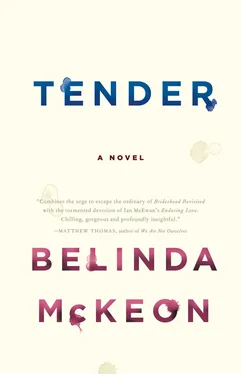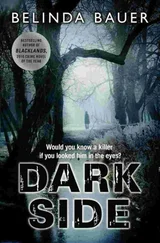“That’s not safe,” he said.
“He’s—” Catherine started to say, coming up next to him, but she was interrupted by James, leaping out of the carriage to hug her, all arms and tightness and laughter and saying her name, over and over. Her name.
“Hi,” Catherine said, her voice a high-pitched, awkward trail.
“Can you let these people behind you on there, please,” the Iarnród Éireann man said angrily.
“Oh, we’re getting on as well,” James said, still with his arms around Catherine.
“Well, will you make up your mind, please,” said Iarnród Éireann.
“James,” Catherine hissed.
“Oh,” he said, squeezing her again. “It’s so good to see you.”
From beside them, a click of the tongue. “For fuck’s sake. Fuckin’…”
Carrigfinn was a farmhouse, whitewashed with black windowsills, a lawn stretching out in front of it. A long tarmacadam drive came down to meet the lane.
“God, I was always so jealous of people who had tarmacadam around their houses when I was a kid,” Catherine said as they walked through the gates. “They could cycle or do roller-skating or whatever they liked.”
“Really?” James said, considering this. “Well, we don’t have any roller skates, but feel free to cycle around the house all weekend if you like.”
“Ha ha.”
“There’s the old fella. Tidy yourself up a bit.”
“What?” Catherine said, alarmed.
“I’m joking, Reilly, for crying out loud.” He raised a hand. “Well, Daddy!” he called.
A man turned from the garage door, which he was painting, Catherine now saw, covering its brown planks over with a vivid green.
“Ye got this far,” he said, putting his brush carefully down and coming towards them. He was tall, with a head of white curls; he wore a pair of navy overalls smeared in several places with green, the sleeves rolled up. His arms were tanned. He came a few steps towards them and stopped, one hand on his hip, the other reaching out, she saw with a jolt of shock, to James.
“Well,” he said, as James, repeating the same word, went right up to him and planted a kiss on his cheek. His father’s hand stayed on James’s shoulder a moment, held the bone of it, then fell away.
“We got a lift out with Fidelma McManus and the mother,” James said, stepping back to where Catherine stood.
“Jaysus, I hope you had plenty of news for them,” his father said with the trace of a smirk. He nodded to Catherine. “Hello.”
“Hi, Mr. Flynn,” Catherine said, sounding yappy and absurd. “Nice to meet you,” she added, in a cooler tone.
“Who’s this lassie?” he said to James. “Tell her not to be calling me names like that.”
“This is Catherine, Daddy,” James said. “Catherine, this is my father, Mick.”
“Very nice to meet you, Catherine,” his father said, and they shook hands.
“Catherine lives with the girls above in Dublin.”
His father made a face. “What girls?”
James made a noise of exasperation. “You know what girls, Daddy, for fuck’s sake. The girls I went to school with. Amy and Lorraine.” He rolled his eyes at Catherine, who tried to laugh. “What girls,” he shook his head.
His father shrugged. “Ah, sure,” he said, and he winked at Catherine. “Sure I can’t keep track of you.”
“You can keep track of what you want to keep track of,” James shot at him.
“And where are you from, Catherine?”
“You went far,” he said drily to James, when she told him. He looked back to the garage door. “And what do you think of my labors?”
“You’re turning the place into a post office, is it?”
It was true: it was that kind of green.
“Ah, get in to your mother and don’t be annoying me,” his father said, swatting a hand to send him away.
James’s coloring was from his mother, Catherine saw. Peggy. Her accent was almost Northern; that singing affection in her words. She had a kind face, and when she saw James she put her arms around him, just the way James had done to Catherine at the train station, and when she was introduced to Catherine, she put her arms around Catherine too. They were just in time for dinner, most of which Peggy spent playfully upbraiding James for not having come down from Dublin to see her and his father sooner, and for hardly ever phoning them, and for not having sent her any postcards from Berlin.
“What in the name of Jesus do you want with postcards from Berlin?” James said, his mouth full.
“Well, I’d just like them, Jem,” his mother said.
“You’ve enough rubbish coming into the house as it is,” James said. “All your bloody catalogues and everything.”
“Oh, Catherine,” Peggy said, looking to her with a face of mock dejection. “He’s an awful boy.”
“He is,” Catherine laughed.
“An awful, awful child. I don’t know where we got him, I’m telling you. All the rest of them are as pleasant as can be.”
“Ah, poor mother,” James said, getting up from his chair and putting his arms around her shoulders; he buried his face in her neck. “You’re an awful bollox, do you know that?”
“Oh, Catherine,” Peggy said now, laughing, her eyes wet. “Do you see what I have to put up with?”
“Ah, you love it,” James said dismissively, kissing her hard on the temple; he slipped back into his chair.
“Oh, God help me,” Peggy said, still laughing, and she pointed to the plate of vegetables in the middle of the table. “Catherine, pet, help yourself there, won’t you now.”
“Oh, by the way, Mammy,” James said, scraping with a knife at the pat of butter, “I can’t go to Edel’s wedding now. Catherine is here.”
“Ah, Jem!” his mother said, putting her cutlery down. “Sure you can’t do that. Sure you can bring the wee girl. Sure they’d all be delighted to meet her.”
James shook his head, not looking up from his plate. “Catherine hates weddings,” he said. “I can’t do it to her.”
“Ah, Jem,” his mother said with a sigh, and that was it; the matter was closed.
Dreams fled away. She just could not think of the rest of that line, but anyway, it did not matter; anyway, within an hour or so, with James’s parents gone off to the wedding, Catherine had other things to think about. She and James had lain out on the lawn for another while, and then James had suggested a walk down to the canal, and it was down by the canal that things became clear — finally, as Catherine thought of it afterwards, although at the time, this clarity did not feel like anything which was continuous with the things which had gone before. At the time, it felt like swimming, which was not something Catherine had ever been able to manage — her arms got tired, and her legs moved wrongly, and her breath got trapped inside her body and thumped its frightened wings — which was to say that at the time, it felt like drowning. What did it matter, she snapped at herself afterwards, whether she felt like drowning, or whether, indeed, she drowned, when it was James who was struggling, James who was speaking, James who was pushing the words out with that strained, clipped sound?
A boat was moving into the lock as they reached the canal, a gleaming white cruiser, on its deck a tanned and patient family — mother, father, two young girls — speaking French, and pointing at the rush of water, and wearing orange life jackets high and blocky on their bodies. Catherine and James waved at them, and smiled at them, and then for a while they sat on the stone bank to watch them, legs hanging down over the lock as the boat rose up below. The children were shouting, and the father was nodding, and the mother was busy with something close to the boat’s controls. The released waters plummeted in from the other side, like so many eaveshoots giving up their store of rain.
Читать дальше












